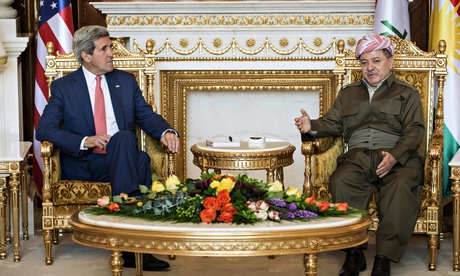General Discussion
Related: Editorials & Other Articles, Issue Forums, Alliance Forums, Region ForumsDoes Democratic Underground favor an independent Kurdistan?
Secretary Kerry's separate stop in Irbil to visit the Kurdish President shows how important that region of northwest Iraq has suddenly become to American hegemony in the Middle East. Kurdistan is the only stable and largely reliable partner we have left in Iraq, but do we want them to stay "in Iraq," or should we support their declaration of independence, as a sovereign Kurdish nation? Most experts do agree independence is the ultimate Kurdish goal. They do have a thriving, oil-based economy. Their military is small but well-equipped and thought to be capable. If not now, when will the Kurds ever have a better chance to claim a homeland?
. . .
US officials believe that persuading the Kurds to stick with the government in Baghdad will help keep Iraq together. "If they decide to withdraw from the Baghdad political process, it will accelerate a lot of the negative trends," said a senior state department official.
Massoud Barzani, the Kurdish president, hardly provided a ringing endorsement for the Iraqi government, "We are facing a new reality and a new Iraq," said Barzani at the start of his meeting with Kerry. Earlier, he blamed prime minister Nouri al-Maliki's "wrong policies" for the violence and called for him to quit, saying it was "very difficult" to imagine Iraq staying together.
Kurdish troops have taken control of Kirkuk, which was abandoned by the Iraqi army after Isis forces seized Mosul at the beginning of a lightning campaign. The Kurds consider Kirkuk – just outside their autonomous zone – their historic capital; its capture makes it more tempting for the Kurds to go it alone rather than sticking with an unpopular and tottering regime.
The Kurdish region is home to several vast oilfields and has maintained stability, in stark contrast to the rest of Iraq. Senior Kurdish officials have said privately that they are no longer committed to Iraq and are biding their time for an opportunity to seek independence.
. . .
http://www.theguardian.com/world/2014/jun/24/john-kerry-urges-kurdish-leaders-to-back-iraqi-government
| 4 votes, 1 pass | Time left: Time expired | |
| The U.S. should support Kurdistan's independence from Iraq. | |
3 (75%) |
|
| The U.S. should oppose Kurdistan's independence from Iraq. | |
0 (0%) |
|
| The U.S. should remain neutral on the question of Kurdistan's independence from Iraq. | |
1 (25%) |
|
| 1 DU member did not wish to select any of the options provided. | |
| Show usernames
Disclaimer: This is an Internet poll |
|
Maedhros
(10,007 posts)another_liberal
(8,821 posts)If they do leave, I hope they have success.
BainsBane
(55,761 posts)and they don't want Turkey invading the new Kurdistan. The Turks have a sizable number of Kurds along the Iraqi border, and they are concerned that they would fight to join Kurdistan. Turkey is a key Muslim ally for the US. So while it's nice to say we support independent self-determination, an informed view requires knowing about the implications for the region.
Additionally, if it isn't the US's business to decide whether Kurdistan should be independent, why would it be DU's?
another_liberal
(8,821 posts)There are also sizable Kurdish populations in Iran and Syria. None of those countries is particularly keen on having an independent Kurdish State on their border; however, that option might be preferable to an ISIS State on their border instead, right?
BainsBane
(55,761 posts)But I don't know that those are the only options. I'm not saying I personally oppose an independent Kurdistan, just that there is more involved than just Iraq.
Lurks Often
(5,455 posts)it would make Syria, Iran & Turkey very unhappy if an independent Kurdistan was formed, as well as even stronger objections from the Sh'ia & Sunni Iraqis.
I'm conflicted, I'd like to see the Kurds get their own country, but I strongly believe it would destabilize an already unstable region even further, possibly as far as a regional war in the Middle East, which has negative global implications.
another_liberal
(8,821 posts)However, the, "Regional war in the Middle East, which has negative global implications," you warn of is already well under way. It might be wise, at this point, to consider carefully what we can seriously expect to hold on to north of Kuwait.
A stable, independent Kurdistan is at least a foothold in the region. Everything else in Iraq may well go to either Iran, ISIS or Saudi Arabia.
Lurks Often
(5,455 posts)involving conventional military forces, not the relatively "lukewarm" civil wars going on right now. It would be more along the lines of Iran-Iraq War II, only involving one or more of the following countries Turkey, Syria, Jordan, the Gulf States and possibly Israel getting dragged into it.
Such a war would raise oil prices significantly, which would affect the US and world economy, it could very well drag in countries outside of the Middle East. Russia, for example, is unlikely to allow Syria to be overrun by the Turkish military and it is equally unlikely that the US could avoid being dragged into such a hypothetical shooting war in the region given our long standing relationships with the various Gulf states and Israel.
*Of the Gulf states (Saudi Arabia, Kuwait, Qatar, UAE & Oman) all spend a significant amount of money (given their GDP's) on modern military equipment from the US, England, France & Germany, however their populations are too small to support a large military. Saudi Arabia, Kuwait, Qatar & Oman spend a higher % of their GDP on their military then the US and the UAE spending by GDP is nearly as much as the US.
http://www.mapsofworld.com/thematic-maps/world-military-expenditures-percent-of-gdp-map.html
Shoulders of Giants
(370 posts)We have never helped the situtation.
